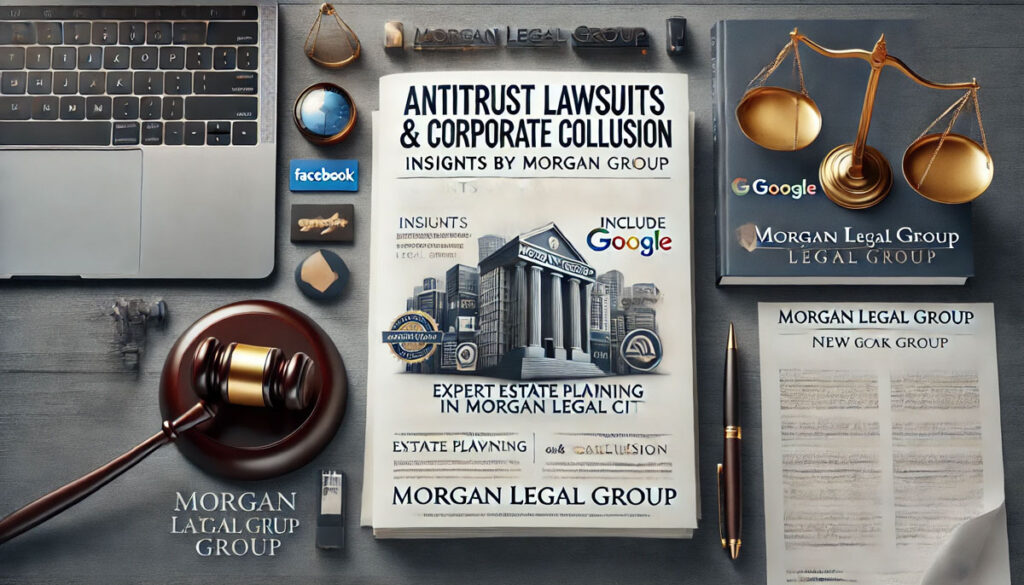Antitrust Lawsuits and Corporate Collusion: Insights by Morgan Legal Group
At Morgan Legal Group, located in New York City, we specialize in estate planning, probate, guardianship, elder law, wills, and trusts. However, our expertise also extends into areas such as antitrust lawsuits and corporate collusion, which have become increasingly relevant in today’s digital age. This article will delve into the complexities of antitrust laws, how corporate giants like Google and Garmin navigate these waters, and the implications for consumers and the market at large.
The Foundation of Antitrust Laws
Antitrust laws are designed to promote fair competition and protect consumers from monopolistic practices that can stifle innovation, limit choices, and increase prices. These laws are essential in ensuring that no single company can dominate a market to the detriment of competitors and consumers alike.
1. What Constitutes a Monopoly?
A monopoly occurs when a company has significant and often exclusive control over a particular market or product. This control allows the company to manipulate prices, limit supply, and exclude competitors, creating an unfair advantage. Antitrust laws aim to prevent such dominance and ensure a level playing field for all businesses.
2. The Role of the Federal Trade Commission (FTC)
The Federal Trade Commission (FTC) is the primary regulatory body responsible for enforcing antitrust laws in the United States. The FTC investigates and prosecutes companies that engage in practices that may harm competition, such as price-fixing, market allocation, and other forms of collusion.
3. Recent Developments in Antitrust Law
In recent years, there has been increased scrutiny of tech giants like Google, Amazon, and Apple, with concerns that their dominance in various markets may violate antitrust laws. These companies wield significant power over digital markets, and their practices have raised questions about whether they are using this power to stifle competition unfairly.
Corporate Collusion and Its Impact on Consumers
Corporate collusion occurs when companies conspire to control a market, manipulate prices, or exclude competitors. This practice is illegal under antitrust laws and can have severe consequences for both businesses and consumers.
1. The Case Against Google
Recently, Google was found to have violated antitrust laws by using its dominance in the search engine market to maintain its position at the expense of competitors. The court ruled that Google was engaging in practices that limited competition and reduced consumer choice. This decision has significant implications for how millions of Americans access information online and could lead to more competition in the search engine market.
2. Garmin’s Similar Practices
Garmin, another major player in the tech industry, has been accused of similar practices. The company allegedly uses its financial power to control what consumers see in search results, favoring advertisers who pay the most for the right keywords. This practice not only limits consumer choice but also stifles competition by making it difficult for smaller companies to compete.
3. The Role of Advertising in Market Control
Advertising plays a crucial role in market control, particularly in the digital age. Companies like Garmin and Google can leverage their vast resources to dominate the advertising space, ensuring that their products and services are more visible than those of their competitors. This control over advertising can effectively monopolize the market, making it difficult for consumers to access unbiased information.
The Legal Battle and Its Implications
The legal battles against companies like Google and Garmin are not just about punishing these giants for their practices. They are also about setting precedents that will shape the future of digital markets and competition.
1. Potential Outcomes for Google
The recent ruling against Google could lead to significant changes in how the company operates. If the ruling is upheld, Google may be forced to provide more options to consumers, allowing them to choose alternative search engines and access a wider range of information. This could reduce Google’s dominance in the search engine market and foster greater competition.
2. The Broader Impact on the Tech Industry
The outcome of these antitrust cases will have far-reaching implications for the tech industry as a whole. If companies like Google and Garmin are found to be in violation of antitrust laws, it could lead to more stringent regulations and oversight of digital markets. This could, in turn, promote greater innovation and competition, benefiting consumers by providing them with more choices and better products.
3. Protecting Consumer Rights
At the heart of these legal battles is the protection of consumer rights. Antitrust laws are designed to ensure that consumers have access to fair and competitive markets. By holding companies accountable for their actions, regulators can help protect consumers from unfair practices and ensure that they have access to a wide range of products and services.
Conclusion: The Importance of Vigilance
As digital markets continue to grow and evolve, it is more important than ever to remain vigilant against practices that could harm competition and limit consumer choice. Companies must be held accountable for their actions, and consumers must be aware of their rights under antitrust laws.
Working with Experienced Legal Professionals
At Morgan Legal Group, we are committed to helping our clients navigate the complexities of antitrust laws and corporate collusion. Our experienced attorneys provide expert guidance and representation, ensuring that your rights are protected and that you have the legal support you need to challenge unfair practices.
Contact Us
If you believe that your company has been affected by corporate collusion or if you need assistance with an antitrust lawsuit, contact Morgan Legal Group today. Our legal experts are here to provide you with the support and representation you need to protect your business and your rights.









